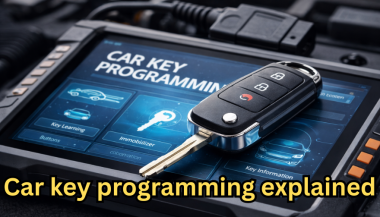Why You Should Consider Aftermarket Car Keys and Parts
When it comes to replacing car keys or parts, many people assume they need to go straight to the dealership for original equipment manufacturer (OEM) options. However, aftermarket car keys and parts offer a reliable, affordable, and often superior alternative. By choosing aftermarket solutions, you can save money, enjoy wider availability, and even customize parts to better suit your needs. Here’s why you should consider aftermarket car keys and parts.
1. Cost-Effective Without Compromising Quality
Let’s face it—car repairs and replacements can get expensive, especially when you go the OEM route. Aftermarket parts are produced by third-party manufacturers and are usually much more affordable.
Significant Savings: You can often save up to 50% compared to dealership prices.
Comparable Quality: Many reputable aftermarket manufacturers meet or exceed OEM standards, delivering reliable performance at a lower cost.
The key is to do your research and purchase parts from trusted suppliers to ensure quality and longevity.
2. Greater Availability and Variety
OEM parts are often tied to a specific car manufacturer, which can limit options and availability. Aftermarket parts, on the other hand, are widely accessible and come in a variety of styles, materials, and features.
Easier to Find: Whether you drive a newer model or an older car, aftermarket keys and parts are readily available in stores and online.
Tailored Choices: Aftermarket solutions allow for customization, such as upgraded key fobs or unique designs that match your personal style.
This variety gives you more flexibility to find the part that best fits your budget and needs.
3. High-Quality Alternatives
There’s a common misconception that aftermarket parts are of lower quality. In reality, many aftermarket manufacturers use advanced technology and durable materials to produce products that rival, or sometimes exceed, OEM quality.
Rigorous Testing: Reputable aftermarket brands follow strict testing protocols to ensure durability and performance.
Improved Features: Some aftermarket keys and parts may include enhanced features, such as better security systems or longer-lasting batteries for key fobs.
By choosing the right provider, you can enjoy high-quality parts that work just as well as—or better than—OEM versions.
4. Faster and More Convenient Solutions
Getting parts or keys from the dealership can be a time-consuming process, often requiring appointments or long waits for shipping. With aftermarket solutions, you can get replacements quickly and hassle-free.
Quick Delivery: Many aftermarket suppliers offer fast shipping options, so you get what you need sooner.
No Middleman: Skip the dealership markup and go straight to trusted providers.
For car owners looking for fast and affordable replacements, aftermarket parts are the perfect solution.
5. Customization and Personalization
One of the standout benefits of aftermarket car keys and parts is the ability to personalize your vehicle to suit your needs and preferences.
Unique Designs: Choose key fobs with modern, sleek designs or personalized engravings.
Performance Upgrades: Many aftermarket parts offer enhanced features, such as stronger key signal ranges or improved materials.
Whether you want a stylish upgrade or improved functionality, aftermarket options let you add a personal touch to your vehicle.
6. Environmentally-Friendly Options
Many aftermarket manufacturers focus on sustainability, offering eco-friendly solutions that help reduce waste.
Recycled Materials: Some aftermarket parts are made using recycled materials, reducing environmental impact.
Longer Lifespan: High-quality aftermarket parts can outlast some OEM options, reducing the need for frequent replacements.
Choosing aftermarket parts can be a smart decision for both your wallet and the planet.
7. Supporting Small Businesses
When you purchase aftermarket car keys or parts, you often support small businesses and independent manufacturers. This helps create a competitive market that benefits consumers.
Affordable Pricing: Increased competition keeps prices lower for car owners.
Innovation: Smaller manufacturers often push for innovation, delivering unique and improved solutions for vehicle owners.
By opting for aftermarket solutions, you contribute to a market that prioritizes affordability, quality, and innovation.
Why Aftermarket Is Worth It
Aftermarket car keys and parts are a smart, affordable choice for car owners who want quality, reliability, and convenience. With a wide variety of options, high-quality alternatives, and opportunities for personalization, aftermarket solutions offer clear advantages over traditional OEM parts.
Next time you need a replacement key or car part, consider exploring aftermarket options. By choosing carefully, you’ll save money, find the perfect fit for your vehicle, and enjoy greater flexibility—all without compromising on quality.

 (1)_1736345149.jpg)
_1740493407.jpg)

 (1)_1736339630.jpg)
